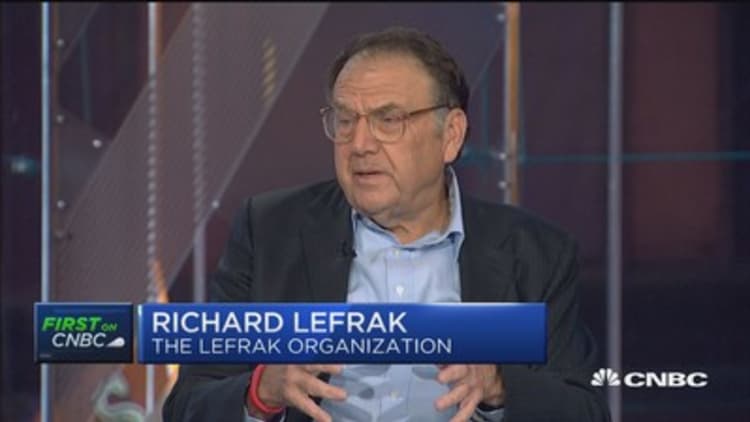Sorely needed — and promised — spending on U.S. infrastructure could mean foreign companies take a slice of the pie.
"It's going to be hard to build out U.S. infrastructure without foreign capital ... or even foreign expertise. We'll need the steel, the iron ore," said Joe Quinlan, head of market and thematic strategy at Merrill Lynch and U.S. Trust.
"If we're going to do bullet trains, that technology is really Japan, Germany, China," he said.
Japanese Prime Minister Shinzo Abe, one of the few world leaders U.S. President Donald Trump is on good terms with, said during his U.S. visit last month that Japan's technical expertise in high-speed rail "could contribute to President Trump's growth strategy. There will be even more new jobs being born in the United States."
U.S. infrastructure received a near-failing grade in a widely followed report last week. Trump has promised to spend $1 trillion on improving areas such as transport, and some say those developments will create the higher-paying jobs needed to help lower- and middle-class Americans.

While health care is the focus in Congress right now, several analysts expect infrastructure proposals to come as early as this summer. As president-elect, Trump had reportedly already circulated a presentation on infrastructure projects and state governors have submitted more than 400 areas in which work could begin immediately.
William Curtin III, partner and global head of global mergers and acquisitions at law firm Hogan Lovells, said the president's proposal to spend $1 trillion on infrastructure has attracted the attention of foreign companies.
"Any global investors or global business person … will take note of that and will inquire what are the opportunities to develop in the U.S.," he said. "Some of them might say to themselves, 'We'd better transact our way into that marketplace ... to be able to capture that work,'" he said, noting one of his overseas clients is looking to expand into U.S. construction.
China also wants a part, despite the Trump administration's repeated anti-China rhetoric.
Chen Jie, director general of the municipal commission of commerce in the major Chinese city of Guangzhou, was confident that certain Chinese companies could compete well for U.S. projects, particularly in areas such as subway construction.
"Regarding U.S. infrastructure construction, I think it can bring in from China, including Guangzhou, strong, capable enterprises to participate," he told CNBC Tuesday. "I believe the marketplace is a fair one and we can fully participate in the competition because of our advantages."
Some analysts also point to government appointees for indications on how international collaboration may be part of policy.
On Trump's National Economic Council, the special assistant to the president for infrastructure policy is D.J. Gribbin. He previously headed government advisory for Macquarie Capital in establishing public-private partnerships, a strategy many say the administration will need to adopt for financing infrastructure projects.
Macquarie owns the world's largest infrastructure asset manager and the financial services firm's headquarters are in Australia, a country that exports many commodities such as iron ore.
The White House did not immediately respond to a CNBC request for comment.
"It's a good thing to have both expertise and inbound investment in infrastructure, because it's a commitment that shows the U.S. is a competitive environment to attract investors and best practices," said Heidi Crebo-Rediker, adjunct senior fellow at the Council on Foreign Relations and CEO of advisory firm International Capital Strategies.
"Inbound investment is a vote of confidence in the U.S.," she said.
However, the enthusiasm from foreign companies may be limited by the Trump administration's focus on "America First."
Dan DiMicco, trade advisor to the president during the campaign, told CNBC in a phone interview that, "American producers will be given first priority in those infrastructure projects."
"Where products are not available, there will be accommodations made to buy those products from where they are available," he said, adding such practice would be "minimal."
DiMicco is former CEO of Nucor and on the board of the nonprofit Coalition for a Prosperous America, which represents the interests of those in manufacturing, agriculture and labor unions.
On Tuesday, the head of the newly formed National Trade Council, Peter Navarro, spoke to the coalition. In an account of that presentation, coalition CEO Michael Stumo told CNBC that "the NTC is going to be the SWAT team. They're going to deal with things like buy American, hire American."
"The NTC is going to be a defender of American production," Stumo said. But, he added, "I don't think 'buy American, hire American' cares so much about ownership as it does about location."


